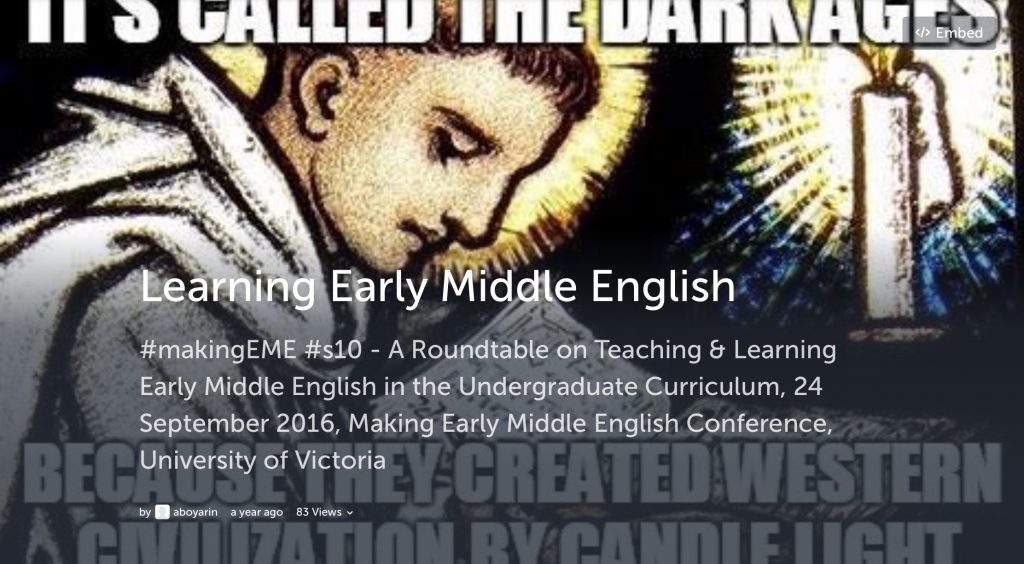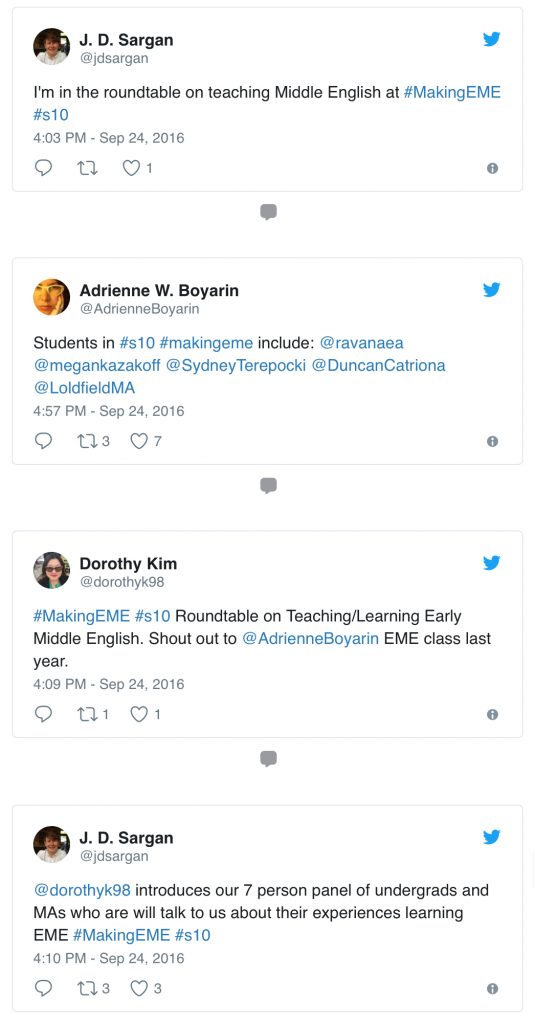QUICK NAVIGATION: weekly schedule
MEDIEVAL STUDIES 310D
Topics in Medieval Studies
“Marvels”
(3 credits)
2017 Winter Term 2
January-April 2018
Tuesday & Thursday 2:00-3:30 p.m.
INSTRUCTOR
Dr Juliet O’Brien
Department of French, Hispanic and Italian Studies
juliet.obrien@ubc.ca
Office: Buchanan Tower 728
Office hours (from 8 January 2018): Monday 3-6 p.m., Tuesday 4-5 p.m., and Thursday 4-6 p.m.
Description
Wonder. Delight. Awe. Joy. Imagination. Marvellousness (mirabilis, merveille, merveillos) suffuses Medieval European literature, crossing postmedieval borders of place (nation-state boundaries), time (early/late), form (literary genre, type of artefact), audience (social class and occupation), and register (high/low). From mermaids, giants, and unicorns to miracles, fairies, and marginal drolleries: Medieval imaginative marvels are a continuing common popular association with the period. Exploring them helps to understand perceptions of “the Medieval,” a history of those perceptions, and what “Medieval” might be itself (or themselves): worlds of speculative fictions, escapism and consolation, metamorphosis and metaphor, playfulness, weirdness, shock, horror, beauty, dark humour, satire, human values, and sheer love of life.
Weekly topics and continuing themes include: perceptions of the natural world, creation and creativity, miracles, other worlds and the other-worldly, monsters, dream-visions and mysticism, the fantastic, hybridity, apocalypse, the idyllic and golden ages, utopias and other alternative worlds, automata, the nature of humanity and/as intelligent life.
Our adventures will centre on the imaginative worlds of some Medieval French texts: the Reynard romance and selections from the writings of Marie de France, Christine de Pizan, and François Rabelais. Other readings include bestiaries, encyclopaedias, universal histories, fables, saints’ lives, maps, almanachs, books of hours, lyric and debate poetry, games, miscellanies, and plenty of marginalia. While our principal focus will be the study of literary works, we will also explore their influence throughout Medieval Europe; the historical landscape in which these landmarks are situated; the cultural background against which their actions are staged; and their relationship to an integrated creative and intellectual environment—including visual and plastic arts, music, ideas, technology, ecology, and the sciences.
Classes consist of interactive lectures interspersed with discussions. Reading assignments include translations of literary works (they may of course be read in the original, but this is not expected), and digitized manuscripts and other contemporary objects freely accessible online. Assessment is based on a midterm commentary paper; a round-table short presentation followed by a student-led discussion or debate; a final research project (“making a marvel”) and its planning, bibliography, and a presentation on it; and, throughout the course, class participation and regular short commentary writing on the course blog.
- The course is taught in English. Work may be written in English or another language according to preference or individual students’ program requirements.
- Prerequisites: none; but bear in mind that this is a 300-level course and will require reading, analysis, and independent research.
- This course is required for the UBC Medieval Studies Major and Minor.
- This course may be taken as an Arts elective.
Required reading
All materials will be read in modern English translation; there are no prerequisites or expectations of prior knowledge of other languages. Original versions will be referred to in class—to add to understanding, and as a taster for continuing with further learning later on—and students may of course work on texts in the original and in manuscripts, for example in their independent final projects.
- Course website: blogs.ubc.ca/mdvl310d
- Marie de France, trans. Judy Shoaf
Lais
May be consulted online (but not copied or otherwise circulated or disseminated) at https://people.clas.ufl.edu/jshoaf/marie_lais/
- anon, trans. Patricia Terry
Renart the Fox
University of California Press, 1992 (any edition, new or used, is fine)
ISBN of current edition: 978-0520076846
- Christine de Pizan, ed. & trans. Renate Blumenfeld-Kosinski & Kevin Brownlee
The Selected Writings of Christine de Pizan
Norton, 1997 (any edition, new or used, is fine)
ISBN of current edition: 978-0393970104
- François Rabelais, trans. M.A. Screech
Gargantua and Pantagruel
Penguin, 2006 (any edition, new or used, is fine)
ISBN of current edition: 978-0140445503
Supplementary readings
- additional readings from references in lectures
- students’ readings for their presentation and final project
Assessment
I. Coursework through the term = 40%
- Regular short writing on the course blog = 10%
Due: from week 3 onwards, at least once a week - Presentation = 20%
Due: from week 4 onwards, set up at the start of term - A commentary (4-5 pages or equivalent) = 10%
Due: end of week 7
II. Final project: MAKE A MARVEL = 60%
- Preparatory work for a final project: the making of a marvel = 10%
—Planning, work-in-progress notes, rough sketch due: week 10
(there will be extra office hours to discuss projects)
—Bibliography / references / methodology outline due: start of week 12 - The (poster) presentation of a final project = 20%
(or preparation for it: your project doesn’t need to be finished by this point!)
Format: a poster session, in which students present their work to fellow MDVL 310D students
Due: week 13 - A final project: a marvel = 30%
7-10 page paper (research, critical, and/or creative writing) or equivalent for visual and plastic arts, physical objects, performances, videos, games, etc.
independent or in a group (then 7-10 pages per person)
Due: end of term
There is no final examination.
Work may be written in English or another language according to preference or program requirements.
Learning objectives
This course aims to provide you with:
- a deeper knowledge about the medieval European world: its culture and literature, against the broad lines of its historical background
- a grasp of how those fit into broader schemes and spheres of reference: European culture before c. 1700, the “pre-modern” world, world literature, literature in English, comparative literature, translation (in the broadest sense), and contemporary global—including local—cultures, including but by no means limited to literature
- reading skills: from fast general-gist reading to very slow, careful, attentive, meticulous close-reading that includes rereading
- fundamental research skills: library, catalogues, databases, reference works, online sources and resources; the collection and sorting of data, prior to its analysis and use; bibliography and synthesis
- writing skills: from short pithy paragraphs to longer forms; constructing sound arguments; using textual evidence and good reasoning; with an emphasis on commentary: the “close writing” that parallels close reading
- last but not least, the development, enhancement, and honing of critical and creative thinking, presentation, and discussion skills: analogy and allegory—paralleling exegesis and analysis—and innovation
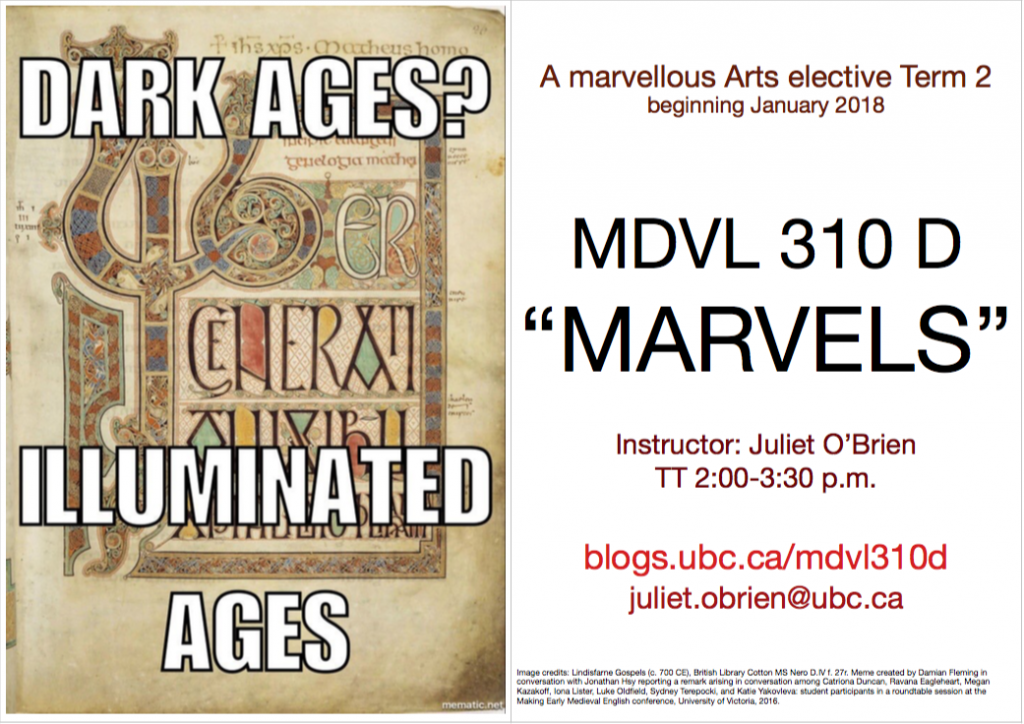
WEEK 1
3-5 January 2018
NO CLASS: PREPARE PRELIMINARY ANSWERS TO THE QUESTION, “WHAT IS A MARVEL?”
WEEK 2
8-12 January 2018
Prologues and the organisation of knowledge: Marie de France, Rabelais (9-14, 203-8, 399-416, 639-47), organisation of student presentations in weeks 4-10
WEEK 3
15-19 January 2018
Bestiaries, fables, metamorphoses: Marie de France
WEEK 4
22-26 January 2018
Hybridity, monstrosity, humanity: Marie de France & Renard the Fox
WEEK 5
29 January – 2 February 2018
Adventure, marginality, apocalypse: Renard the Fox
WEEK 6
5-9 February 2018
Miracles, visions, mysticism: Christine de Pizan
Student presentation: Anne
WEEK 7
12-16 February 2018
Utopias and other alternate/~ive worlds: Christine de Pizan
ASSESSMENT DUE: commentary (end of the week = midnight on Sunday)
MIDTERM BREAK / READING WEEK
17-25 February 2018
(for reading and thinking and sleeping, +/- dream visions…)
WEEK 8
26 February – 2 March 2018
The fantastic: François Rabelais, Pantagruel
Student presentations: Angela, Emma
WEEK 9
5-9 March 2018
Medievalism and speculative fiction: François Rabelais, Gargantua
WEEK 10
12-16 March 2018
The weird: François Rabelais, Third & Fourth Books
Tuesday: discussion of blog questions
Thursday student presentations: Ian + Coco
ASSESSMENT DUE: Preparatory work for a final project: the making of a marvel
—Planning, work-in-progress notes, rough sketch (Thursday 15 March)
WEEK 11
19-23 March 2018
Tuesday student presentations: Cara + Jimmy + Lena
Thursday student presentations: Kelsa + Sebastiane + Daphne + Kirsten
WEEK 12
26-30 March 2018
Epilogues and other conclusions: all four texts
ASSESSMENT DUE: Preparatory work for a final project: the making of a marvel
—Bibliography / references / methodology outline due (end of the week)
WEEK 13
2-6 April 2018
Epilogues and other conclusions: all four texts
ASSESSMENT DUE (this will be our work in the Thursday class this week): Final (poster) presentations on final projects as “festival of learning” fair
Friday 20 April
ASSESSMENT DUE: A final project: a marvel
Course information may be subject to change: all updates will be posted on this site, and the version here should be regarded as the Official & Authoritative one.

Musées royaux des beaux-arts de Belgique, Brussels
Learning outcomes
The marvellous medievalist meme at the top of this page is an exemplary case of what this course is aiming towards, not just at but also beyond its end: thinking Medievally and/or Medievalistically. These ends cannot (and therefore will not) be formally assessed or quantified at this course’s end. Here is an exemplary case, which also shows how such a learning outcome is vital but also fundamentally (and indeed essentially) unpredictable.
The meme at the top of this page has as its base image f. 27r of the Lindisfarne Gospels (c. 700 CE), British Library Cotton MS Nero D.IV.
The meme was made by Damian Fleming in conversation with Jonathan Hsy. He was reporting a remark arising in conversation among Catriona Duncan, Ravana Eagleheart, Megan Kazakoff, Iona Lister, Luke Oldfield, Sydney Terepocki, and Katie Yakovleva: student participants in a roundtable session on Teaching & Learning Early Middle English in the Undergraduate Curriculum at the Making Early Medieval English conference at the University of Victoria (2016). The meme’s storification adds further participants: Dorothy Kim and other online scribes live-tweeting, Adrienne Boyarin who taught the course that influenced and inspired the students.
Creative credits are therefore a conjunction of: that manuscript’s makers; a library and its preservation and digitisation teams; and a conference, its organisers and participants, and their extension and its continuation in conversations outside a formal situation and online.
Students were central contributors to this creative process, bringing in what they had been learning in formal courses and applying that learning after and outside a formal class and its assignments.
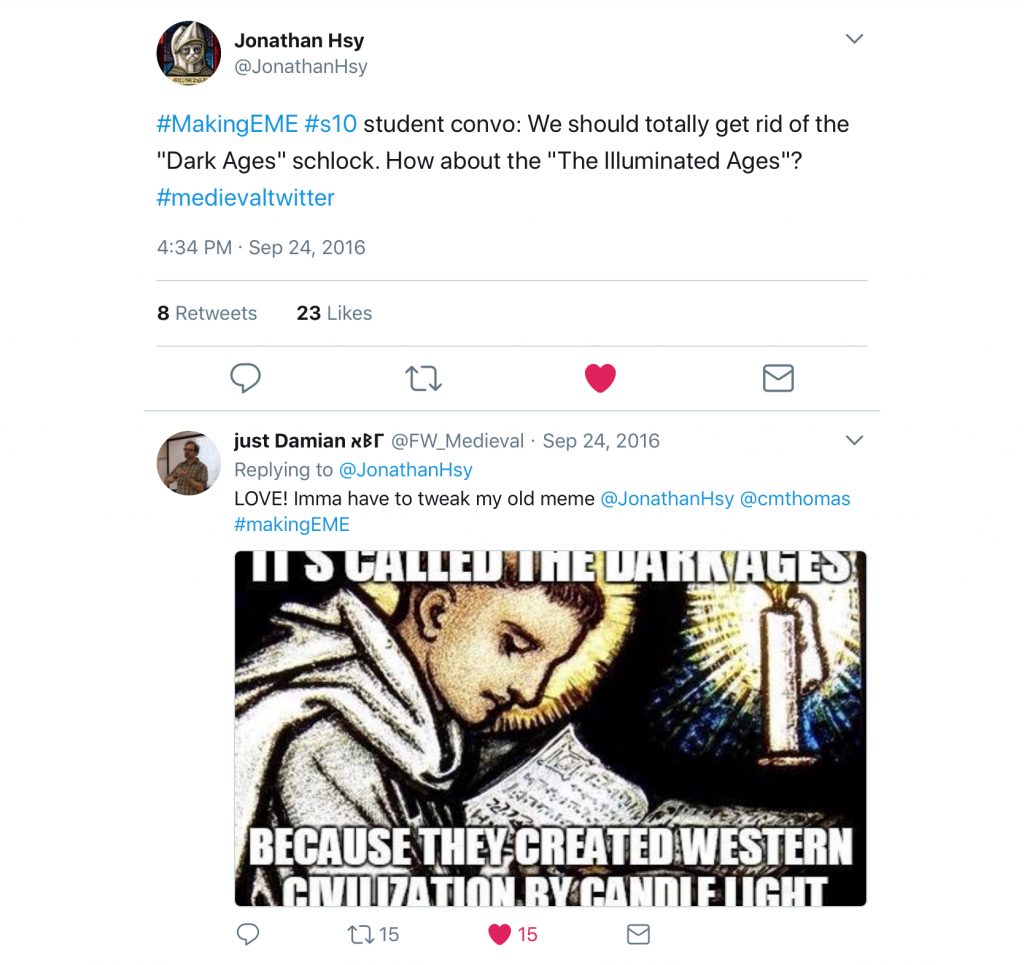
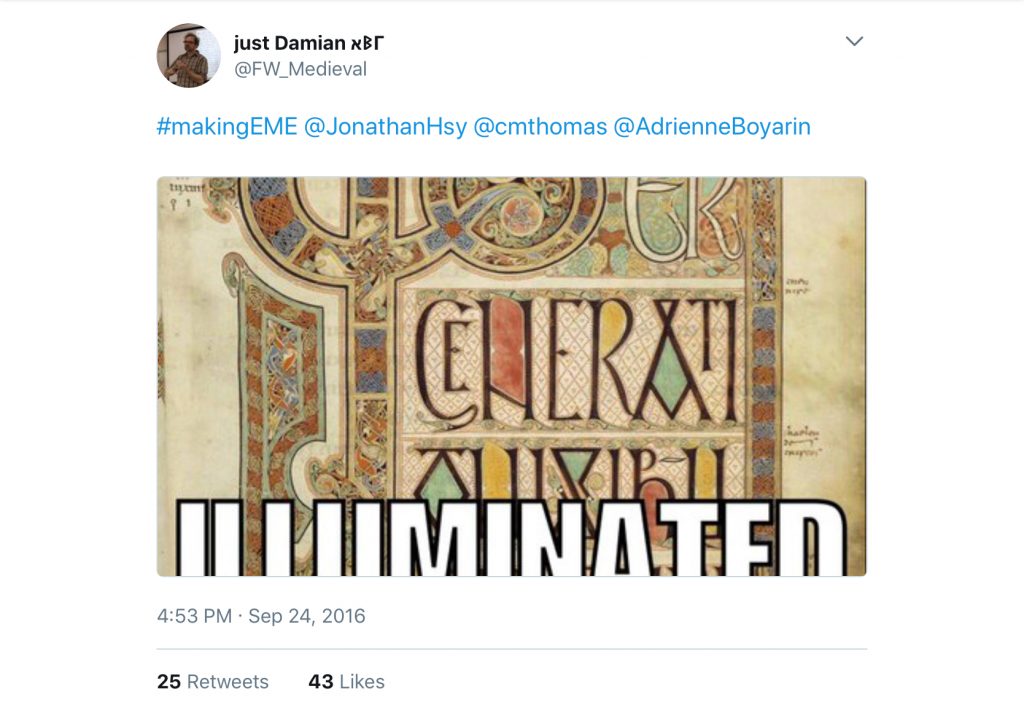
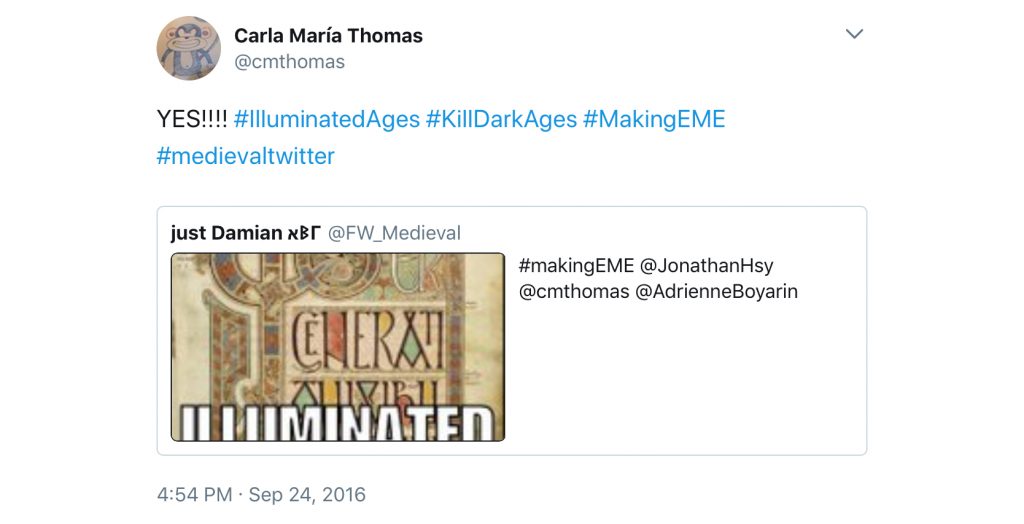
(Images above, as elsewhere on this site, are linked to their sources.)
Part of this meme’s posterity, reading and reception history, and creative and critical influence is #IlluminatedAges as a #medievaltwitter public cooperative research network innovation.

